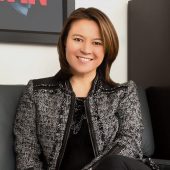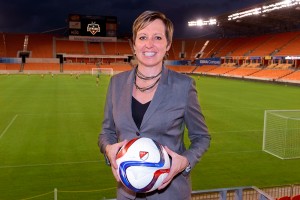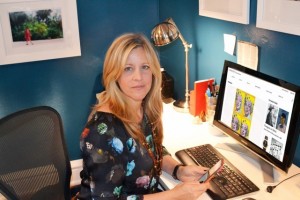Caroline Cummings: Venture Catalyst Manager, Salesperson Extraordinaire, Fan of Mentoring, and Cooking Devotee
A big believer in the concept of eclecticism, Caroline Cummings attended several colleges, and by her own count, hopscotched around seven different job categories before landing her current position as Venture Catalyst Manager at the Regional Accelerator Innovation Network (RAIN). Her background was particularly helpful for this position, since it concentrates on helping entrepreneurs, who by definition are bucking trends and the usual expectations, and creating their own, often very lucrative success.
Originally from New Jersey, she grew-up in a family culture of “working hard,” “making it on your own,” and “not accepting charity.” Which strongly influenced who she is and her passion for “advocating for the underdog” and mentoring “at risk” youths. A graduate of Drexel University in Philadelphia, where she majored in Corporate Communications and PR, she is now based in Oregon, and is a fan of many things: the Jersey shore, the suffragist Lucy Stone, and in the professional world, a “commission-based incentive structure,” which she has insisted upon in every sales job she has had since she was sixteen and selling shoes, and which, she says, “is why I’m such a good salesperson today.”
Can you tell the readers a little bit about yourself?
I’m a technology entrepreneur who loves mentoring other entrepreneurs. I believe that if everyone were mentored and mentored others, the world would be a more compassionate place.
What does a day in your shoes typically look like?
I wake up around 6 a.m., then I drink a glass of vitamin-infused water; take 5-10 minutes to mediate and clear my head; check my email to make sure I’m addressing the most important issues at the onset of the day; and I put in an 8-10-hour work day, depending on what’s going on that day. Then I hit the boxing gym twice a week at 4:30pm with my personal trainer; I head home to make a healthy dinner for my husband (which de-stresses me), and usually one of the “kids” we mentor (we mentor kids between 10-30 years old); my husband and I spend most evenings hanging out with one of the “kids” we mentor, listening to them and helping them think through their life’s challenges and successes. Mentoring is the most rewarding things my husband and I do together. I end my day by checking my calendar to see what the next few days have in store for me so I can mentally prepare myself.
What are the first three things you do when you wake up in the morning and the last three things you do before you go to bed?
First three things: drink a glass of vitamin-infused water, check my email, take five minutes of meditation to clear my head, and get ready for my day.
Last three things: Check my calendar, read a book, then take three minutes to meditate to reflect on my day.
What and who inspires your work?
I am inspired by the many women who came before me and made huge sacrifices that allow me today to hold leadership positions. In particular, I’m inspired by the suffragists and the heroes of the civil rights movement. Women like Lucy Stone, who at a time when women were not allowed to vote, put her life on the line for current and future women’s rights. She showed me the importance of stepping outside of your comfort zone to not only better yourself, but to also move a society forward and leave an important legacy.
How does your culture/background influence your work?
I grew up in a family culture where the mantras were all about “working hard,” “making it on your own,” and “not accepting charity.” I also heard that “you can’t take it with you,” when it came to money, so I learned how to have a great work ethic and how to be a good earner when it came to money – but not so much about how to manage money. I learned the hard way about the differences between earning money and capturing money – there’s a huge difference between the two. These mantras effect my current work and life because I understand the importance of doing work that is meaningful to me, having a budget so I know what to spend, save, and share. Money is a powerful tool that should be respected and not feared. It’s when I changed the relationship I had with money that I was able to make my money work for me, as opposed to me working for my money.
What keeps you energized and motivated at work?
Surrounding myself with entrepreneurs, innovators and people who support and invest in entrepreneurship. There’s nothing more exciting than communicating with people who are thinking up new and better ways of doing things in the world or challenging the impossible. Entrepreneurs are risk-takers, and their energy brings out my inner entrepreneur, which in turn helps me feel like I can accomplish anything.
What has been your biggest obstacle in your career and how did you overcome it?
The biggest obstacle in my career was actually finding my career! I went through several colleges before I figured out what it was I wanted to do in my professional life. I don’t regret any of those early experiences though, because they taught me what my natural skills are: being a good leader, negotiating and selling, and inspiring others to identify and reach their full potential.
Three questions you like to ask during an interview to know if the candidate (or job) is the right fit?
-
-
- “Tell me about a time when you failed at something. How did you respond to that failure and what did you learn from it?” Rationale: It’s important I work with people who are comfortable with failure. We live in a business culture where “failure is not an option,” and I call bull— on that. Most of the great things in life have come from making many mistakes before getting to the innovation, and I need people on my team who are comfortable with failure, since that’s where the lessons are. Success is a terrible teacher!
- “What does it look like when people disagree with you?” Rationale: Disagreements in the workplace are inevitable, so this question tells me what they consider to be conflicts in the workplace. I also want to know how they respond when people challenge them or their ideas.
- “Describe your comfort zone to me in the workplace – what does it look like to step outside of that comfort zone?” Rationale: This question alone moves people outside of their comfort zone. I observe how they react to being put on the spot. This also helps me understand hear where they boundaries are in the workplace.
-
What are the most important qualities of a good leader?
It’s really about balancing an effective mix of intelligence, trustworthiness, humaneness, courage, and sternness – knowing how and when to use these traits. It’s said best in The Art of War: “Reliance on intelligence alone results in rebelliousness. Exercise of humaneness alone results in weakness. Fixation on trust results in folly. Dependence on the structure of courage results in violence. Excessive sternness of command results in cruelty. When one has all five virtues together, each appropriate to its function, then one can be a military leader.”
What advantages do you see as a woman in the workplace?
I’ve mostly been one of the only women (if not the only one) in meetings and on teams since I graduated from Drexel University and entered the corporate business world. It’s most likely mainly because I’ve worked in technology for the last eighteen years and it’s a male-dominated field. I have always used this to my advantage. I’ve always tended to view things differently from men, so when I’m in meetings I often ask non-traditional questions and challenge ideas being presented. I believe the voice of dissent in a conversation is important. I often play this role and it’s worked well for me over the years and many of my ideas get implemented.
What advice would you give women starting their career?
Find a mentor (or two). Find someone doing what you want to do and ask them to meet with you for an informational interview. I also think it’s important to learn about the value of opportunities. I have a saying about this: “Life comes down to three things, and they all have to do with opportunities: knowing when to take one when it comes your way, knowing when to pass on one, and knowing when and how to offer opportunities to others.”
What book would you recommend for women just starting their career?
This is a tough one, there are so many good ones, but if I had to pick one it would be Women Don’t Ask: Negotiation and the Gender Divide. The sooner women learn how to advocate for themselves and step outside of their comfort zones, the sooner they will realize and share their full potential with others.
Favorite Quote: “Anything worthwhile is difficult.” — Coco Chanel
24TAGS: SharpSavvySignificant
 Effective Communication
Effective Communication Women Making History
Women Making History Grants & Funding Sources
Grants & Funding Sources Interview Prep
Interview Prep Impactful Leadership
Impactful Leadership Dressing for Work
Dressing for Work Dressing for Your Style
Dressing for Your Style Interview Style Tips
Interview Style Tips Women's Stocking Stuffers
Women's Stocking Stuffers Gift the Busy Traveler
Gift the Busy Traveler Airport Layover Activities
Airport Layover Activities Traveling & Eating Healthy
Traveling & Eating Healthy Travel Like a Boss Lady
Travel Like a Boss Lady The Dual California Life
The Dual California Life Gifts for Thanksgiving
Gifts for Thanksgiving Summer Reading List
Summer Reading List Top Leisurely Reads
Top Leisurely Reads New Year, New Books
New Year, New Books Life Lessons from a Sitcom
Life Lessons from a Sitcom Oprah, Amy or Amal?
Oprah, Amy or Amal?














